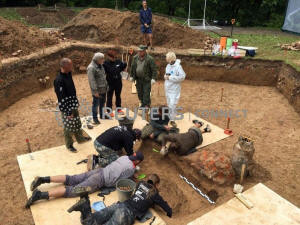Remains of one of Napoleon's 1812 generals believed found in Russia
 Send a link to a friend
Send a link to a friend
 [July 10, 2019]
By Andrew Osborn [July 10, 2019]
By Andrew Osborn
MOSCOW (Reuters) - More than 200 years
after he died of his battlefield wounds in Russia, archaeologists
believe they have found the remains of one of Napoleon Bonaparte's
favorite generals buried in a park beneath the foundations of a dance
floor.
General Charles Etienne Gudin, whose name is inscribed on the Arc de
Triomphe in Paris, died aged 44 on August 22, 1812, after being hit by a
cannon ball during Napoleon's unsuccessful invasion of Russia.
Gudin was personally known to and respected by Napoleon, and after his
death his heart was cut out and carried to Paris to be placed in a
chapel in the French capital's Pere Lachaise cemetery.
A bust of his likeness resides in the Palace of Versailles, and a Paris
street bears his name.

A team of French and Russian archaeologists say they discovered what
they believe to be Gudin's missing remains on July 6 during a dig in the
Russian city of Smolensk, 400 km (250 miles) west of Moscow.
Records from the period indicate that Gudin's battlefield injuries meant
he had to have his left leg amputated and also suffered damage to his
right leg.
Archaeologists say the remains which they found in a coffin are
consistent with those injuries and believe "with a high degree of
probability" that they have found the aristocrat and veteran of both the
French Revolutionary and Napoleonic wars.
French historian and archaeologist Pierre Malinovsky, who played a
central role in the discovery, has hailed the find as the culmination of
a long search.
[to top of second column]
|

Archaeologists take part in excavation works after they discovered
what they believe to be the burial site of French General Charles
Etienne Gudin in a park in Smolensk, Russia in this handout picture
obtained by Reuters on July 9, 2019. Smolensk newspaper 'Rabochy-put.ru'/Handout
via REUTERS

"It's a historic moment not only for me but for I think for our two
countries," Malinovsky told Smolensk newspaper Rabochy Put (Worker's
Journey), saying Napoleon had personally known Gudin since his
childhood.
"Napoleon was one of the last people to see him alive which is very
important, and he's the first general from the Napoleonic period
that we have found."
The Russian military-historical society, which was also involved in
the dig, said the find, if confirmed, would be a sensation. "It's
possible that we'll have to identify the remains with the aid of a
DNA test which could take from several months to a year," it said.
"The general's descendants are following the news."
(Editing by Mark Heinrich)
[© 2019 Thomson Reuters. All rights
reserved.]
Copyright 2019 Reuters. All rights reserved. This material may not be published,
broadcast, rewritten or redistributed.
Thompson Reuters is solely responsible for this content.
 |